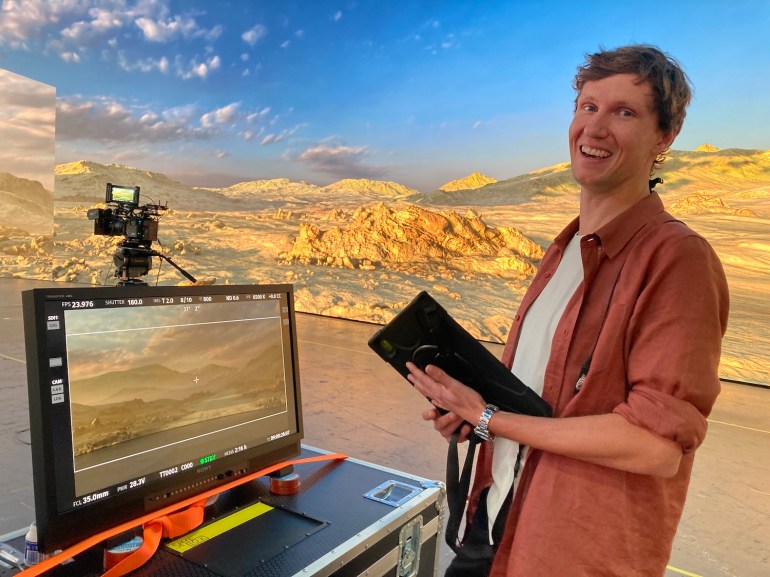There was never any doubt in Oscar Knott’s mind that he’d be making films for a living.
After all, he shot his first film at aged 10 and made more than 40 short films while he was still at school.
“I borrowed my dad’s video camera that he used for holiday movies, got all of my stuffed toys together and made an action movie. Then I’d go to drama classes to get the students to be in my films, learning film by film how I could make them more Hollywood.”
But the job he has now wasn’t even a twinkle in anyone’s eye at that time. He’s the virtual production supervisor at NantStudios at Docklands Studios Melbourne – a purpose-built production campus with six stages and more than 10,000 square metres of space. It includes the largest virtual production stage in the world.
“I’m like a conduit on the film set, translating some of the complicated lingo and ideas that we have on our back end to the filmmakers in a form that makes more sense, while working with my team to ensure they’re delivering what’s requested of them.”
Knott attended the small independent school Korowal in the Blue Mountains near Sydney and, when he was 13, they organised a couple of days work experience at Animal Logic. It firmly planted the idea of a future career in his mind.
When he left school, he had planned to go to a film school, but started working in the industry instead.
He got a runner gig on a film made in the Blue Mountains – A Few Best Men – and landed other work in various assistant roles on films like Wolverine, on short films and TVCs.
But visual effects nagged. He’d kept the business card of the recruitment manager at Animal Logic and contacted them, saying he had a reel of all of the visual effects he had done on his 40 short films and he wanted to talk about a job.
“It was a very bloody and gory show reel. I was obsessed with horror movies with zombies and blood spraying out of people. Lots of blood.”
Based on that, he was offered a four-week rotoscoping training course with Animal Logic which may lead to a job and allowed him to bypass university.
Rotoscoping is an entry level job which, in those days was done frame by frame.
He did well at the course but there was no job so, for six months, he went back to his basic telemarketer work to pay the bills. Then came his first ever professional gig on The Great Gatsby – as a roto painter. He was on his way.
For the next few years, he worked in visual effects as a Compositor around the world – in Singapore for one of the Star Wars franchise, in London for the James Bond film No Time to Die, George Clooney’s The Midnight Sky and, most importantly, The Mandalorian – the first series to use virtual production, working with Charmaine Chan, a virtual production pioneer.
Chan recommended Knott for Thor: Love and Thunder – the first big movie to use an LED volume – at Fox Studios in Sydney as a virtual production technical director. He also worked on Amazon’s Lord of the Rings series and Mission: Impossible Dead Reckoning – Part One, joining Nant Studios in 2022 in Melbourne.
“My career narrative? I think it’s been exploring aspects of the film industry from behind the camera to behind the computer and now, behind the LED wall; exposing myself to all of the different jobs, roles and responsibilities and all the crafts and creativity that comes with all of those things.”
He’s now found a perfect role to bring together all of those skills – helping to guide filmmakers to achieve the vision they’re trying to deliver for their film, commercial or TV project.
That team consists of LED stage technicians, camera techs, software content operators and motion capture techs with very different skills sets and background – and lots of different communications styles.
“To get the best out of your team it’s important to always be navigating this with a lot of patience, respect and emotional intelligence. Listening to your team and always spending a moment to take on board what they have said before making decisions is important to achieve the best work, keep morale up and to motivate your team to go above and beyond their baseline responsibilities.”
He says the mood is heavily influenced by heads of department.
“A lot of egos fly around on a production, and it becomes extra important to keep a tight grip on your own so that you can remain objective when considering requests and suggestions from team members and clients. This is something I am sure I will be working on for my whole career!
“A daily meditation practice has helped me a lot throughout the years to keep composed and let the chaos glide over me.”
Denise Eriksen is co-founder (with Esther Coleman Hawkins) of Media Mentors Australia.
The company has recently opened applications for management and leadership training for early career HODs or 2ICs ready to take the next step in their careers.


